formerly eScholarship Editions


|
|
|
|
Your search for
'Classics' in subject
found 117 book(s). | Modify Search | Displaying 21 - 40 of 117 book(s) | |
| 21. | 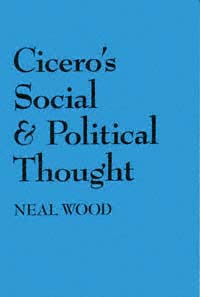 | Title: Cicero's social and political thought Author: Wood, Neal Published: University of California Press, 1991 Subjects: Classics | Classical Philosophy | Political Theory Publisher's Description: In this close examination of the social and political thought of Marcus Tullius Cicero (106-43 B.C.), Neal Wood focuses on Cicero's conceptions of state and government, showing that he is the father of constitutionalism, the archetype of the politically conservative mind, and the first to reflect ex . . . [more] Similar Items |
| 22. | 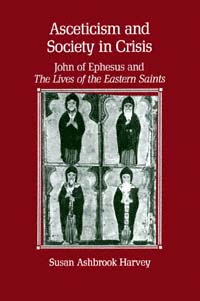 | Title: Asceticism and society in crisis: John of Ephesus and the Lives of the Eastern saints Author: Harvey, Susan Ashbrook Published: University of California Press, 1990 Subjects: Classics | Classical Religions | Classical History Publisher's Description: John of Ephesus traveled throughout the sixth-century Byzantine world in his role as monk, missionary, writer and church leader. In his major work, The Lives of the Eastern Saints , he recorded 58 portraits of monks and nuns he had known, using the literary conventions of hagiography in a strikingly personal way. War, bubonic plague, famine, collective hysteria, and religious persecution were a part of daily life and the background against which asceticism developed an acute meaning for a beleaguered populace. Taking the work of John of Ephesus as her guide, Harvey explores the relationship between asceticism and society in the sixth-century Byzantine East.Concerned above all with the responsibility of the ascetic to lay society, John's writing narrates his experiences in the villages of the Syrian Orient, the deserts of Egypt, and the imperial city of Constantinople. Harvey's work contributes to a new understanding of the social world of the late antique Byzantine East, skillfully examining the character of ascetic practices, the traumatic separation of "Monophysite" churches, the fluctuating roles of women in Syriac Christianity, and the general contribution of hagiography to the study of history. [brief] Similar Items |
| 23. | 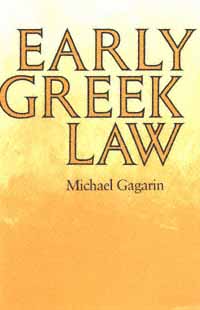 | Title: Early Greek law Author: Gagarin, Michael Published: University of California Press, 1989 Subjects: Classics | Classical Politics | Law Publisher's Description: Drawing on the evidence of anthropology as well as ancient literature and inscriptions, Gagarin examines the emergence of law in Greece from the 8th through the 6th centuries B.C., that is, from the oral culture of Homer and Hesiod to the written enactment of codes of law in most major cities. Similar Items |
| 24. | 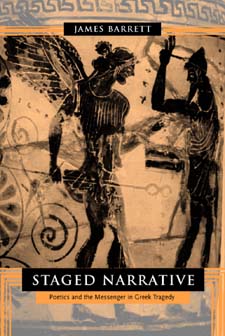 | Title: Staged narrative: poetics and the messenger in Greek tragedy Author: Barrett, James 1953- Published: University of California Press, 2002 Subjects: Classics | Classical Literature and Language Publisher's Description: The messenger who reports important action that has occurred offstage is a familiar inhabitant of Greek tragedy. A messenger informs us about the death of Jocasta and the blinding of Oedipus, the madness of Heracles, the slaughter of Aigisthos, and the death of Hippolytus, among other important events. Despite its prevalence, this conventional figure remains only little understood. Combining several critical approaches - narrative theory, genre study, and rhetorical analysis - this lucid study develops a synthetic view of the messenger of Greek tragedy, showing how this role illuminates some of the genre's most persistent concerns, especially those relating to language, knowledge, and the workings of tragic theater itself. James Barrett gives close readings of several plays including Aeschylus's Persians, Sophocles' Electra and Oedipus Tyrannus, and Euripides' Bacchae and Rhesos. He traces the literary ancestry of the tragic messenger, showing that the messenger's narrative constitutes an unexplored site of engagement with Homeric epic, and that the role illuminates fifth-century b.c. experimentation with modes of speech. Breaking new ground in the study of Athenian tragedy, Barrett deepens our understanding of many central texts and of a form of theater that highlights the fragility and limits of human knowledge, a theme explored by its use of the messenger. [brief] Similar Items |
| 25. | 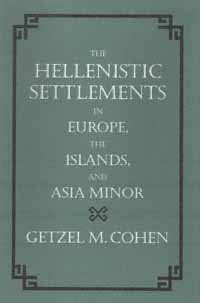 | Title: The Hellenistic settlements in Europe, the islands, and Asia Minor Author: Cohen, Getzel M Published: University of California Press, 1996 Subjects: Classics | History | Ancient History Publisher's Description: This compendium provides historical narratives, detailed references, citations, and commentaries on all the cities founded or refounded in Europe, The Islands, and Asia Minor during the Hellenistic period. Organized coherently in more than 180 entries, it is one of the most significant reference wor . . . [more] Similar Items |
| 26. | 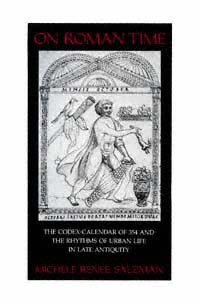 | Title: On Roman time: the codex-calendar of 354 and the rhythms of urban life in late antiquity Author: Salzman, Michele Renee Published: University of California Press, 1991 Subjects: Classics | Religion | Classical History Publisher's Description: Because they list all the public holidays and pagan festivals of the age, calendars provide unique insights into the culture and everyday life of ancient Rome. The Codex-Calendar of 354 miraculously survived the Fall of Rome. Although it was subsequently lost, the copies made in the Renaissance remain invaluable documents of Roman society and religion in the years between Constantine's conversion and the fall of the Western Empire.In this richly illustrated book, Michele Renee Salzman establishes that the traditions of Roman art and literature were still very much alive in the mid-fourth century. Going beyond this analysis of precedents and genre, Salzman also studies the Calendar of 354 as a reflection of the world that produced and used it. Her work reveals the continuing importance of pagan festivals and cults in the Christian era and highlights the rise of a respectable aristocratic Christianity that combined pagan and Christian practices. Salzman stresses the key role of the Christian emperors and imperial institutions in supporting pagan rituals. Such policies of accomodation and assimilation resulted in a gradual and relatively peaceful transformation of Rome from a pagan to a Christian capital. [brief] Similar Items |
| 27. | 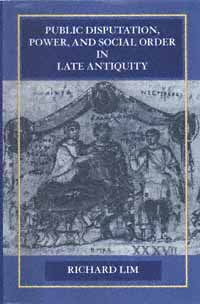 | Title: Public disputation, power, and social order in late antiquity Author: Lim, Richard 1963- Published: University of California Press, 1995 Subjects: Classics | Classical Religions | Religion | Christianity Publisher's Description: Richard Lim explores the importance of verbal disputation in Late Antiquity, offering a rich socio-historical and cultural examination of the philosophical and theological controversies. He shows how public disputation changed with the advent of Christianity from a means of discovering truth and self-identification to a form of social competition and "winning over" an opponent. He demonstrates how the reception and practice of public debate, like other forms of competition in Late Antiquity, were closely tied to underlying notions of authority, community and social order. [brief] Similar Items |
| 28. | 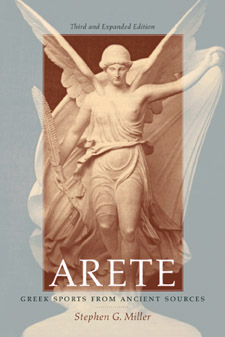 | Title: Arete: Greek sports from ancient sources Author: Miller, Stephen G. (Stephen Gaylord) 1942- Published: University of California Press, 2004 Subjects: Classics | Ancient History | Sports Publisher's Description: From the informal games of Homer's time to the highly organized contests of the Roman world, Miller has compileda trove of ancient sources: Plutarch on boxing, Aristotle on the pentathlon, Philostratos on the buying and selling of victories, Vitruvius on literary competitions, and Xenophon on female body building. With nearly 50 percent more texts than the highly successful second edition, this new version of Arete offers readers an absorbing lesson in the culture of Greek athletics from the greatest of teachers, the ancients themselves, and demonstrates that the concepts of virtue, skill, pride, valor, and nobility embedded in the word arete are only part of the story from antiquity. [brief] Similar Items |
| 29. | 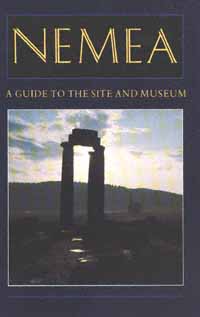 | Title: Nemea: a guide to the site and museum Author: Miller, Stephen G. (Stephen Gaylord) 1942- Published: University of California Press, 1989 Subjects: Classics | History | Archaeology | Ancient History Publisher's Description: In classical antiquity, beginning in 573 B.C., Nemea hosted international athletic competitions like those at Olympia, Delphi, and Isthmia; the games at the four sites constituted the Panhellenic cycle, and the victors were the most famous athletes of antiquity. Nemea was never a city-state but served as a religious and athletic festival center where the Greek world assembled every two years under a flag of truce.Since 1974, excavations sponsored by the University of California at Berkeley have revealed many details of Nemea's history, as well as evidence for the nature of the buildings and other facilities which were part of the festival center. These discoveries, together with smaller finds in the museum and ancient literary and epigraphic sources, form the basis of a new and sharply defined picture of the Nemean Games.This guidebook is an introduction to the history and physical remains of the festival center and a complement to detailed final publications on the excavation now being prepared. [brief] Similar Items |
| 30. | 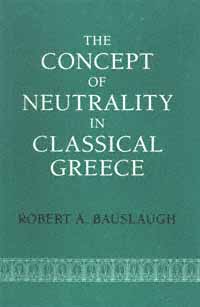 | Title: The concept of neutrality in classical Greece Author: Bauslaugh, Robert A Published: University of California Press, 1991 Subjects: Classics | Law | Classical History Publisher's Description: Looking at Classical warfare from the perspective of the non-belligerents, Robert A. Bauslaugh brings together the scattered evidence testifying to neutral behavior among the Greek city-states and their non-Greek neighbors. Were the Argives of 480/479 B.C. really "Medizers," as many have accused, or were they pursuing a justifiable policy of neutrality as they claimed? On what basis in international law or custom did the Corcyraeans claim non-alignment? Why were the leading belligerent states willing to accept the inclusion of a "neutrality clause" in the Common Peace of 371? These questions have not been asked by historians of international law, and the answers provide a far more complex and sophisticated picture of interstate relations than has so far been available.Despite the absence of exclusively diplomatic language, the concept of respect for neutrals appears early in Greek history and remains a nearly constant feature of Classical wars. The problems confronting uncommitted states, which have clear parallels in modern history, were balanced by widespread acceptance of the need for limitations on the chaos of warfare. [brief] Similar Items |
| 31. | 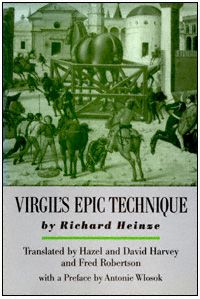 | Title: Virgil's epic technique Author: Heinze, Richard 1867-1929 Published: University of California Press, 1994 Subjects: Classics | Literature in Translation Publisher's Description: Heinze's study, originally published in German in 1903, remains a classic of Virgil scholarship. This translation makes the book available in English for the first time. Similar Items |
| 32. | 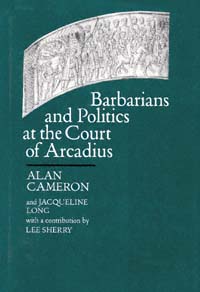 | Title: Barbarians and politics at the Court of Arcadius Author: Cameron, Alan Published: University of California Press, 1993 Subjects: Classics | Religion | Ancient History Publisher's Description: The chaotic events of A.D. 395-400 marked a momentous turning point for the Roman Empire and its relationship to the barbarian peoples under and beyond its command. In this masterly study, Alan Cameron proposes a complete rewriting of received wisdom concerning the social and political history of these years. Our knowledge of the period comes to us in part through Synesius of Cyrene, who recorded his view of events in his De regno and De providentia . By redating these works, Cameron offers a vital, new interpretation of the interactions of pagans and Christians, Goths and Romans.In 394/95, during the last four months of his life, the emperor Theodosius I ruled as sole Augustus over a united Roman empire that had been divided between at least two emperors for most of the preceding one hundred years. Not only did the death of Theodosius set off a struggle between Roman officeholders of the two empires, but it also set off renewed efforts by the barbarian Goths to sieze both territory and office. Theodosius had encouraged high-ranking Goths to enter Roman military service; thus well placed, their efforts would lead to Alaric's sack of Rome in 410. Though Cameron's interest is in the particularities of events, the book conveys a wonderful sense of the general time and place. Cameron's rebuttal of modern scholarship, which pervades the narrative, enhances the reader's engagement with the complexities of interpretation. The result is a sophisticated recounting of a period of crucial change in the Roman Empire's relationship to the non-Roman world. [brief] Similar Items |
| 33. | 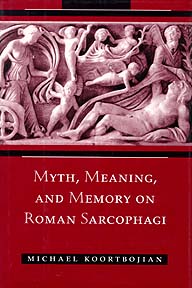 | Title: Myth, meaning, and memory on Roman sarcophagi Author: Koortbojian, Michael Published: University of California Press, 1995 Subjects: Classics | Art | Art History | Art and Architecture Publisher's Description: Michael Koortbojian brings a novel approach to his study of the role of Greek mythology in Roman funerary art. He looks at two myths - Aphrodite and Adonis and Selene and Endymion - not only with respect to their appearance on Roman sarcophagi, but also with regard to the myths' significance in the greater fabric of Roman life. Moving beyond the examination of these sarcophagi as artistic achievements, he sets them in their broader historical and social contexts.Remembrance was an important factor in ancient social life and fueled the need for memorials. In helping us to understand the powerful allusions that Greek myths presented for the Romans, and the role of those allusions in preserving the memory of the dead, Koortbojian effectively widens our vision of the ancient world. [brief] Similar Items |
| 34. | 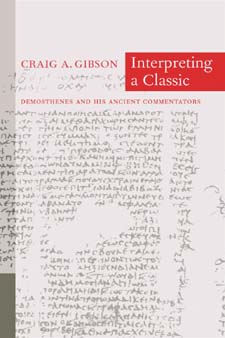 | Title: Interpreting a classic: Demosthenes and his ancient commentators Author: Gibson, Craig A 1968- Published: University of California Press, 2002 Subjects: Classics | Classical Literature and Language | Rhetoric | Classical History Publisher's Description: Demosthenes (384-322 b.c.) was an Athenian statesman and a widely read author whose life, times, and rhetorical abilities captivated the minds of generations. Sifting through the rubble of a mostly lost tradition of ancient scholarship, Craig A. Gibson tells the story of how one group of ancient scholars helped their readers understand this man's writings. This book collects for the first time, translates, and offers explanatory notes on all the substantial fragments of ancient philological and historical commentaries on Demosthenes. Using these texts to illuminate an important aspect of Graeco-Roman antiquity that has hitherto been difficult to glimpse, Gibson gives a detailed portrait of a scholarly industry that touched generations of ancient readers from the first century b.c. to the fifth century and beyond. In this lucidly organized work, Gibson surveys the physical form of the commentaries, traces the history of how they were passed down, and explains their sources, interests, and readership. He also includes a complete collection of Greek texts, English translations, and detailed notes on the commentaries. [brief] Similar Items |
| 35. | 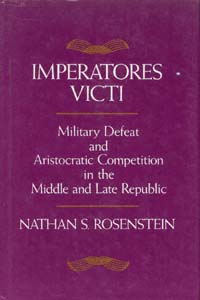 | Title: Imperatores victi: military defeat and aristocratic competition in the middle and late republic Author: Rosenstein, Nathan Stewart Published: University of California Press, 1990 Subjects: Classics | Classical History | Military History | Ancient History Publisher's Description: Given the intense competition among aristocrats seeking public office in the middle and late Roman Republic, one would expect that their persistent struggles for honor, glory, and power could have seriously undermined the state or damaged the cohesiveness of the ruling class. Rome in fact depended on aristocratic competition, since no professional bureaucracy directed public affairs and no salary was attached to any public office. But as Rosenstein adeptly shows, competition appears to have been surprisingly limited, in ways that curtailed the possible destructive effects of all-out contests between individuals. Imperatores Victi examines one particularly striking case of such checks on competition. Military success at all times represented an abundant source of prestige and political strength at Rome. Generals who led armies to victory enjoyed a better-than-average chance of securing higher office upon their return from the field. Yet this study demonstrates that defeated generals were not barred from public office and in fact went on to win the Republic's most highly coveted and hotly contested offices in numbers virtually identical with those of their undefeated peers.Rosenstein explores how this unexpected limit to competition functions, reviewing beliefs about the religious origins of defeat, assumptions about common soldiers' duties in battle, and definitions of honorable behavior of an aristocrat during a crisis. These perspectives were instrumental in shifting the onus of failure away from a general's person and in offering positive strategies a general might use to win glory and respect even in defeat and to silence potential critics among a failed general's peers. Such limits to competition had an impact on the larger problems of stability and coherence in the Republic and its political elite; these larger problems are discussed in the concluding chapter. [brief] Similar Items |
| 36. | 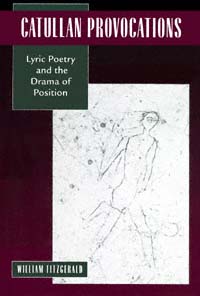 | Title: Catullan provocations: lyric poetry and the drama of position Author: Fitzgerald, William 1952- Published: University of California Press, 1996 Subjects: Classics | Comparative Literature | Classical Literature and Language | Poetry Publisher's Description: Restoring to Catullus a provocative power that familiarity has tended to dim, this book argues that Catullus challenges us to think about the nature of lyric in new ways. Fitzgerald shows how Catullus's poetry reflects the conditions of its own consumption as it explores the terms and possibilities of the poet's license. Reading the poetry in relation to the drama of position played out between poet, poem, and reader, the author produces a fresh interpretation of almost all of Catullus's oeuvre. Running through the book is an analysis of the ideological stakes behind the construction of the author Catullus in twentieth-century scholarship and of the agenda governing the interpreter's position in relation to Catullus. [brief] Similar Items |
| 37. | 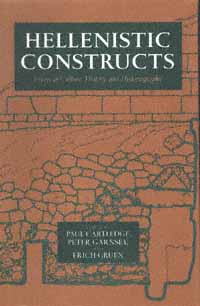 | Title: Hellenistic constructs: essays in culture, history, and historiography Author: Cartledge, Paul Published: University of California Press, 1997 Subjects: Classics | Classical History | History | Ancient History Publisher's Description: The Hellenistic period (approximately the last three centuries B.C.), with its cultural complexities and enduring legacies, retains a lasting fascination today. Reflecting the vigor and productivity of scholarship directed at this period in the past decade, this collection of original essays is a wide-ranging exploration of current discoveries and questions. The twelve essays emphasize the cultural interaction of Greek and non-Greek societies in the Hellenistic period, in contrast to more conventional focuses on politics, society, or economy. The result of original research by some of the leading scholars in Hellenistic history and culture, this volume is an exemplary illustration of the cultural richness of this period.Paul Cartledge's introduction contains an illuminating introductory overview of current trends in Hellenistic scholarship. The essays themselves range over broad questions of comparative historiography, literature, religion, and the roles of Athens, Rome, and the Jews within the context of the Hellenistic world. The volume is dedicated to Frank Walbank and includes an updated bibliography of his work which has been essential to our understanding of the Hellenistic period. [brief] Similar Items |
| 38. | 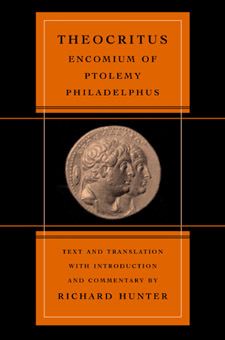 | Title: Encomium of Ptolemy Philadelphus Author: Theocritus Published: University of California Press, 2003 Subjects: Classics | Classical Literature and Language | Poetry Publisher's Description: Under Ptolemy II Philadelphus, who ruled Egypt in the middle of the third century B.C.E., Alexandria became the brilliant multicultural capital of the Greek world. Theocritus's poem in praise of Philadelphus - at once a Greek king and an Egyptian pharaoh - is the only extended poetic tribute to this extraordinary ruler that survives. Combining the Greek text, an English translation, a full line-by-line commentary, and extensive introductory studies of the poem's historical and literary context, this volume also offers a wide-ranging and far-reaching consideration of the workings and representation of poetic patronage in the Ptolemaic age. In particular, the book explores the subtle and complex links among Theocritus's poem, modes of praise drawn from both Greek and Egyptian traditions, and the subsequent flowering of Latin poetry in the Augustan age. As the first detailed account of this important poem to show how Theocritus might have drawn on the pharaonic traditions of Egypt as well as earlier Greek poetry, this book affords unique insight into how praise poetry for Ptolemy and his wife may have helped to negotiate the adaptation of Greek culture that changed conditions of the new Hellenistic world. Invaluable for its clear translation and its commentary on genre, dialect, diction, and historical reference in relation to Theocritus's Encomium, the book is also significant for what it reveals about the poem's cultural and social contexts and about Theocritus' devices for addressing his several readerships. COVER IMAGE: The image on the front cover of this book is incorrectly identified on the jacket flap. The correct caption is: Gold Oktadrachm depicting Ptolemy II and Arsinoe (mid-third century BCE; by permission of the Museum of Fine Arts, Boston). [brief] Similar Items |
| 39. | 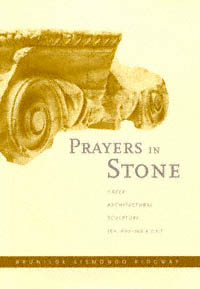 | Title: Prayers in stone: Greek architectural sculpture ca. 600-100 B.C.E Author: Ridgway, Brunilde Sismondo 1929- Published: University of California Press, 1999 Subjects: Classics | Art | Art and Architecture | Art History Publisher's Description: The meaning of architectural sculpture is essential to our understanding of ancient Greek culture. The embellishment of buildings was common for the ancient Greeks, and often provocative. Some ornamental sculpture was placed where, when the building was finished, no mortal eye could view it. And unlike much architectural ornamentation of other cultures, Greek sculpture was often integral to the building, not just as decoration, and could not be removed without affecting the integrity of the building structure. This book is the first comprehensive treatment of the significance of Greek architectural sculpture. Brunilde Sismondo Ridgway, a world-class authority on ancient Greek sculpture, provides a highly informative tour of many dimensions of Greek public buildings - especially temples, tombs, and treasuries - in a text that is at once lucid, accessible, and authoritative.Ridgway's pragmatism and common sense steer us tactfully and clearly through thickets of uncertainty and scholarly disagreement. She refers to a huge number of monuments, and documents her discussions with copious and up-to-date bibliographies. This book is sure to be acknowledged at once as the standard treatment of its important topic. [brief] Similar Items |
| 40. | 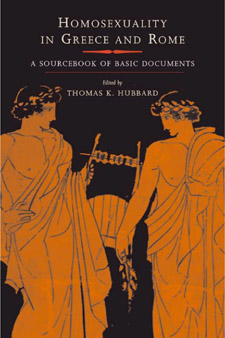 | Title: Homosexuality in Greece and Rome: a sourcebook of basic documents Author: Hubbard, Thomas K Published: University of California Press, 2003 Subjects: Gender Studies | Classics | GayLesbian and Bisexual Studies Publisher's Description: The most important primary texts on homosexuality in ancient Greece and Rome are translated into modern, explicit English and collected together for the first time in this comprehensive sourcebook. Covering an extensive period - from the earliest Greek texts in the late seventh century b.c.e. to Greco-Roman texts of the third and fourth centuries c.e. - the volume includes well-known writings by Plato, Sappho, Aeschines, Catullus, and Juvenal, as well as less well known but highly relevant and intriguing texts such as graffiti, comic fragments, magical papyri, medical treatises, and selected artistic evidence. These fluently translated texts, together with Thomas K. Hubbard's valuable introductions, clearly show that there was in fact no more consensus about homosexuality in ancient Greece and Rome than there is today. The material is organized by period and by genre, allowing readers to consider chronological developments in both Greece and Rome. Individual texts each are presented with a short introduction contextualizing them by date and, where necessary, discussing their place within a larger work. Chapter introductions discuss questions of genre and the ideological significance of the texts, while Hubbard's general introduction to the volume addresses issues such as sexual orientation in antiquity, moral judgments, class and ideology, and lesbianism. With its broad, unexpurgated, and thoroughly informed presentation, this unique anthology gives an essential perspective on homosexuality in classical antiquity. [brief] Similar Items |